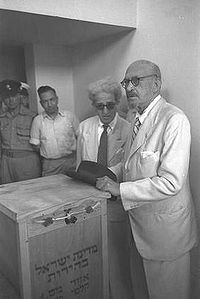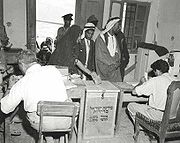
Israeli legislative election, 1951
Encyclopedia


Elections in Israel
Elections in Israel are based on nationwide proportional representation. The electoral threshold is currently set at 2%, with the number of seats a party receives in the Knesset being proportional to the number of votes it receives. The Knesset is elected for a four-year term, although most...
for the second Knesset were held in Israel
Israel
The State of Israel is a parliamentary republic located in the Middle East, along the eastern shore of the Mediterranean Sea...
on 30 July 1951. Voter turnout was 75.1%.
Results
| Party | Votes | % | Seats | +/- |
|---|---|---|---|---|
| Mapai Mapai Mapai was a left-wing political party in Israel, and was the dominant force in Israeli politics until its merger into the Israeli Labor Party in 1968... ¹ |
256,456 | 37.3 | 45 | |
| General Zionists General Zionists The General Zionists were centrists within the Zionist movement and a political party in Israel. Their political arm is an ancestor of the modern-day Likud.-History:... ² |
111,394 | 16.2 | 20 | |
| Mapam Mapam Mapam was a political party in Israel and is one of the ancestors of the modern-day Meretz party.-History:Mapam was formed by a January 1948 merger of the Hashomer Hatzair Workers Party and Ahdut HaAvoda Poale Zion Movement. The party was originally Marxist-Zionist in its outlook and represented... ¹ |
86,095 | 12.5 | 15 | |
| Hapoel HaMizrachi Hapoel HaMizrachi Hapoel HaMizrachi |Mizrachi]] Workers) was a political party and settlement movement in Israel and is one of the predecessors of the National Religious Party.-History:... |
46,347 | 6.8 | 8 | |
| Herut Herut Herut was the major right-wing political party in Israel from the 1940s until its formal merger into Likud in 1988, and an adherent of Revisionist Zionism.-History:... |
45,651 | 6.6 | 8 | |
| Maki Maki (historical political party) Maki was a communist political party in Israel. It is not the same party as the modern day Maki, which split from it during the 1960s and later assumed its name.-History:... ¹ |
27,334 | 4.0 | 5 | |
| Progressive Party Progressive Party (Israel) The Progressive Party was a political party in Israel.-History:The Progressive Party was a liberal party, most of whose founders came from the ranks of the New Aliyah Party and HaOved HaTzioni, which had been active prior to independence... |
22,171 | 3.2 | 4 | |
| Democratic List for Israeli Arabs Democratic List for Israeli Arabs The Democratic List for Israeli Arabs was a political party in Israel.-History:In the 1951 elections the party gained 2% of the vote and won 3 seats, which were taken by Seif el-Din el-Zoubi, Masaad Kassis and Jabr Muadi... |
16,370 | 2.0 | 3 | New |
| Agudat Yisrael | 13,799 | 2.0 | 3 | |
| Sephardim and Oriental Communities Sephardim and Oriental Communities Sephardim and Oriental Communities was a political party in Israel and is one of the ancestors of the modern-day Likud party.-History:The Sephardim and Oriental Communities party represented Sephardi Jews and Mizrahi Jews who were already living in Israel at the time of independence, and was part... ² |
12,002 | 1.8 | 2 | |
| Poalei Agudat Yisrael | 11,194 | 1.6 | 2 | |
| Mizrachi Mizrachi (political party) Mizrachi was a political party in Israel and is one of the ancestors of the modern-day National Religious Party.-History:The Mizrachi movement was founded in 1902 in Vilnius as a religious Zionist organisation. It also had a trade union, Hapoel HaMizrachi, started in 1921... |
10,383 | 1.5 | 2 | |
| Progress and Work Progress and Work Progress and Work was a political party in Israel.-History:The Progress and Work party was an Israeli Arab organisation formed to fight the 1951 elections... |
8,067 | 1.2 | 1 | New |
| Yemenite Association Yemenite Association The Yemenite Association was a political party in Israel.-History:The party was founded by Yemenite Jews in 1923. It took part in Israel's first elections in 1949, crossing the electoral threshold by just 53 votes, and winning one seat, which was taken by Zecharia Glosca.Despite the influx of... |
7,965 | 1.2 | 1 | 0 |
| Agriculture and Development Agriculture and Development Agriculture and Development was a political party in Israel.-History:Agriculture and Development was an Israeli Arab organisation formed to fight the 1951 elections... |
7,851 | 1.1 | 1 | New |
| Sepharadim-Ashkenazim Unity | 4,038 | 0.6 | 0 | New |
| For New Immigrants and Freed Soldiers | 375 | 0.1 | 0 | New |
| Invalid/blank votes | 7,515 | |||
| Total | 695,007 | 100 | 120 | 0 |
| Source: Nohlen et al | ||||
¹ Rostam Bastuni
Rostam Bastuni
Rostam Bastuni was an Israeli politician and journalist, and the first Arab citizen of Israel to represent a Zionist party in the Knesset.-Biography:Bastuni was born into a Christian family in Mandate Palestine from the mixed city of Haifa...
, Avraham Berman and Moshe Sneh
Moshe Sneh
Moshe Sneh was an Israeli politician and military figure. One of the founders of Mapam, he later joined the Israeli Communist Party , and was one of the leaders of a more pro-Israeli split in 1965.-Biography:...
left Mapam and set up the Left Faction
Left Faction
The Left Faction was a short-lived political party in Israel.-History:The Left Faction was formed on 20 February 1952 as a breakaway from Mapam in the aftermath of the Prague Trials...
. Bastuni later returned to Mapam whilst Berman and Sneh joined Maki. Hannah Lamdan
Hannah Lamdan
Hannah Lamdan was a Serbia-born Israeli politician who served as a member of the Knesset for several left-wing parties between 1949 and 1965.-Biography:...
and David Livschitz
David Livschitz
David Livschitz was a Russia-born Israeli politician who served as a member of the Knesset for Mapam, the Faction independent of Ahdut HaAvoda and Mapai between 1951 and 1959.-Biography:...
left Mapam and set up the Faction independent of Ahdut HaAvoda
Faction independent of Ahdut HaAvoda
The Faction independent of Ahdut HaAvoda was a short-lived political party in Israel.-History:The Faction independent of Ahdut HaAvoda was formed on 20 January 1953 as a breakaway from Mapam in the aftermath of the Prague Trials...
before joining Mapai. Four other members left Mapam to found Ahdut HaAvoda - Poale Zion
Ahdut HaAvoda
Ahdut HaAvoda was the name used by a sequence of political parties that existed firstly during Mandate Palestine and later in Israel. Its original version, led by David Ben-Gurion, is one of the main ancestors of the modern-day Israeli Labor Party....
, but the move was not recognised by the Knesset speaker.
² Sephardim and Oriental Communities joined the General Zionists
The Second Knesset
The second Knesset was highly unstable, with four separate governments and two different Prime MinistersPrime Minister of Israel
The Prime Minister of Israel is the head of the Israeli government and the most powerful political figure in Israel . The prime minister is the country's chief executive. The official residence of the prime minister, Beit Rosh Hamemshala is in Jerusalem...
. As with the first Knesset, the speaker was Yosef Sprinzak
Yosef Sprinzak
Yosef Sprinzak was a leading Zionist activist in the first half of the 20th century, an Israeli politician, and the first Speaker of the Knesset, a role he held from 1949 until his death in 1959....
.
Third government
The second Knesset started with David Ben-GurionDavid Ben-Gurion
' was the first Prime Minister of Israel.Ben-Gurion's passion for Zionism, which began early in life, led him to become a major Zionist leader and Executive Head of the World Zionist Organization in 1946...
forming the third government of Israel (the first Knesset
Israeli legislative election, 1949
Elections for the Constituent Assembly were held in newly independent Israel on 25 January 1949. Voter turnout was 86.9%. Two days after its first meeting on 14 February 1949, legislators voted to change the name of the body to the Knesset...
had two governments) on 8 October 1951. His Mapai party formed a coalition with Mizrachi, Hapoel HaMizrachi, Agudat Yisrael, Agudat Yisrael Workers and the three Israeli Arab parties, the Democratic List for Israeli Arabs, Progress and Work and Agriculture and Development. Like the first Knesset, there were 15 ministers. The government resigned on 19 December, 1952 due to a dispute with the religious parties over religious education
Religious education
In secular usage, religious education is the teaching of a particular religion and its varied aspects —its beliefs, doctrines, rituals, customs, rites, and personal roles...
.
Fourth government
Ben-Gurion formed the fourth government on 24 December 1952, dropping the ultra-orthodoxHaredi Judaism
Haredi or Charedi/Chareidi Judaism is the most conservative form of Orthodox Judaism, often referred to as ultra-Orthodox. A follower of Haredi Judaism is called a Haredi ....
parties (Agudat Yisrael and Agudat Yisrael Workers) and replacing them with the General Zionists and the Progressive Party. The new government had 16 ministers. Ben-Gurion resigned on 6 December 1953 as he wished to settle in the Negev
Negev
The Negev is a desert and semidesert region of southern Israel. The Arabs, including the native Bedouin population of the region, refer to the desert as al-Naqab. The origin of the word Neghebh is from the Hebrew root denoting 'dry'...
kibbutz
Kibbutz
A kibbutz is a collective community in Israel that was traditionally based on agriculture. Today, farming has been partly supplanted by other economic branches, including industrial plants and high-tech enterprises. Kibbutzim began as utopian communities, a combination of socialism and Zionism...
of Sde Boker
Sde Boker
Sde Boker is a kibbutz in the Negev desert of southern Israel. Best known as the retirement home of Israel's first Prime Minister, David Ben-Gurion, it falls under the jurisdiction of Ramat HaNegev Regional Council.-History:...
.
Fifth government
Moshe SharettMoshe Sharett
Moshe Sharett on 15 October 1894, died 7 July 1965) was the second Prime Minister of Israel , serving for a little under two years between David Ben-Gurion's two terms.-Early life:...
formed the fifth government on 26 January 1954 with the same coalition partners and ministers. Sharett resigned on 29 June 1955, when the General Zionists refused to abstain from voting on a motion of no-confidence
Motion of no confidence
A motion of no confidence is a parliamentary motion whose passing would demonstrate to the head of state that the elected parliament no longer has confidence in the appointed government.-Overview:Typically, when a parliament passes a vote of no...
brought by Herut and Maki over the government's position on the trial of Malchiel Gruenwald
Malchiel Gruenwald
Malchiel Gruenwald was an Israeli hotelier, amateur journalist and stamp collector, who came to public attention in 1953, when he accused an Israeli government employee, Rudolf Kastner, of having collaborated with the Nazis during the Holocaust.- Biography :Gruenwald was born in Hungary, and...
, who had accused Rudolf Kastner
Rudolf Kastner
Rudolf Israel Kastner was a Jewish-Hungarian journalist and lawyer who became known for facilitating the departure of Jews out of Nazi-occupied Hungary during the Holocaust...
of collaborating with the Nazis.
Sixth government
Sharett formed the sixth government on 29 June 1955, eliminating the General Zionists and the Progressive Party from the coalition and reducing the number of ministers to 12. The new government did not last long, as a general election was called for 26 July 1955.External links
- Historical overview of the Second Knesset Knesset website
- Knesset Elections Results: Second Knesset Knesset website
- Factional and Government Make-Up of the Second Knesset Knesset website

